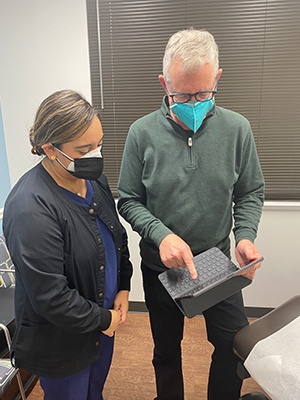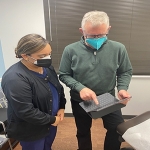In recognition of Hernia Awareness Month this June, we're sharing some information you should know about hernias.

What is a Hernia?
Hernias occur when organs protrude through the surrounding muscular wall. They typically develop in the abdominal wall when the intestine pushes through a weakened area. But they can also develop in the groin, chest or where incisions from surgery do not heal properly.
Types of Hernias
The most common abdominal wall hernia is an inguinal hernia. Inguinal hernias can occur in women, but males are naturally more prone to them. You can be born with an inguinal hernia but may not experience symptoms until adulthood. Most inguinal hernias in adults result from strain on abdominal muscles weakened by age.
Other types of hernias include:
- Umbilical (near the belly button)
- Incisional (near the site of a surgical scar)
- Femoral (upper thigh/outer groin)
- Epigastric (above the belly button)
- Hiatal (when part of the stomach bulges through the diaphragm)
- Sports (chronic groin pain in athletes)
Symptoms + Risk Factors
The symptoms of hernias vary depending on location and most are related to the surrounding organs. Sometimes the onset is gradual, with no symptoms other than the development of a bulge. Some may go away and come back, and others may appear suddenly accompanied by pain. Hernias can get larger over time and swell.
Factors that may accelerate the growth of a hernia include:
- Weight gain, which causes an increase in abdominal wall tension
- Chronic constipation
- Chronic cough or upper respiratory infection
- Straining to urinate, as with an enlarged prostate
In some cases, a hernia will become strangulated, causing blood supply to be cut off and the tissue to swell. Symptoms of this often include:
- Acute pain that comes on suddenly and may get more severe
- Nausea
- Vomiting
- Constipation
- Darkening or reddening of the skin over the hernia
- Fatigue
- Fever
- Inability to pass gas
- Inflammation or tenderness around the hernia
- Increased heart rate
If a hernia becomes strangulated, it can lead to a life-threatening surgical emergency. If you suspect you have a hernia or if you are experiencing any of these symptoms, it's important to speak with your doctor.
Treatment
Hernias that are not causing pain or other symptoms may or may not require surgery. However, some hernias, such as femoral hernias, are more likely to develop complications and should be surgically fixed. Surgery is the only way to repair a hernia because they do not heal on their own. It's important to consult with a doctor if you think you have a hernia. Early intervention can prevent complications and possible emergency surgery.
In general, hernia repair can be done open, laparoscopically or robotically. Open repair involves a traditional incision about the size of the hernia opening. Laparoscopic and robotic hernia surgery are performed through multiple small incisions. Choosing the right technique for a hernia repair is a complex decision. At Austin Surgeons, our surgeons take into consideration the patient’s preference, health, and the complexity of the hernia when determining the best surgical technique.
For more information about hernias and hernia repairs, visit austinsurgeons.net or call (512) 467-7151. Request an appointment online with one of our board-certified general surgeons in Austin or Lockhart here.
For the latest Austin Surgeons news, follow us on Facebook and Instagram.

